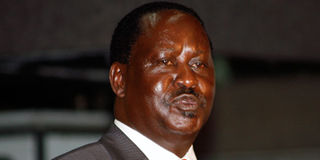PM’s unfulfilled ambition to become president

Prime Minister Raila Odinga has been part of the democratic change that has swept Kenya for over three decades. Photo/FILE
Prime Minister Raila Odinga has been part of the democratic change that has swept Kenya for over three decades.
His well-documented role in the struggle to open up the democratic space in the country stretches back to the early 1980s when he and other pro-change agents were branded dissidents by the Kanu regime, detained without trial or forced into exile.
He is arguably Kenya’s longest-serving political detainee. As MP, minister, party leader and Prime Minister at various times in his long political career, Mr Odinga led the push for political reforms which gave Kenya a new Constitution in 2010.
Yet, it has been a case of so near yet so far when it comes to securing the ultimate prize in power — the presidency. If he came close yesterday, he was a hair’s breadth away from State House in five years ago.
Mr Odinga and his supporters believe that he was robbed of victory in 2007 after which the international community helped craft a grand coalition government which saw him share power with President Kibaki.
After an uneasy start during which the coalition was faced with squabbles, the PM settled down to work with the hope that things would go his way the next time.
Yet even as the son of Kenya’s first Vice-President, Jaramogi Oginga Odinga, put his best foot forward in his third stab at the presidency, multiple hurdles threatened his march to State House.
First, the PM and his Coalition of Democracy and Reform were faced with voter apathy in their strongholds. Figures from the Independent Electoral and Boundaries Commission were less than impressive in percieved ODM strongholds and in “swing” counties.
While Mr Odinga commanded near-total support in Nyanza, analysts warned that supporters could let him down, “because they were having a victory party without their voters’ cards”. This worrying state of affairs contrasted sharply with ballooning figures from Jubilee Coalition areas.
Second, Mr Odinga, 68, went to the ballot without the support of key politicians who backed him in 2007. Commentators questioned whether his famed uncanny “power of the rebound” would come to his rescue as he fought the battle of his life in which time was not on his side.
Third, during the campaigns, Mr Odinga had to deal with fears that he was likely to haul the four suspects facing charges of crimes against humanity to the International Criminal Court if he won the presidency.
His attempt to address these fears by promising to petition the UN Security Council to have those cases brought back home appears to have been taken with skepticism, with voters in Central and Rift Valley still roundly voting against him.
Fourth, that Mr Odinga, a Prime Minister in the coalition government, was vying for the presidency on a joint-ticket with Vice-President Kalonzo Musyoka also saw him fend off criticism that he was part of the status quo.
Mr Odinga’s first stab at the presidency was in 1997 when he came third while in 2002, he chose to back President Kibaki. He has disputed Monday’s election results, saying he will go to the Supreme Court to challenge them.
“I have fought for democracy for long and I am not about to surrender,” he said on Saturday. Whatever the outcome of the move, many are wondering whether this election marks the end of an era or the beginning of another.




